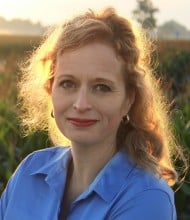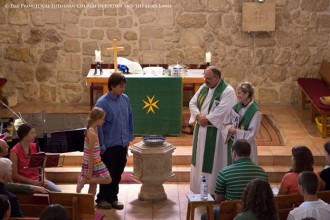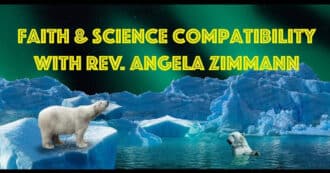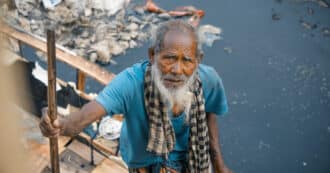Interview by Siiri Bigalke of The Interfaith Center for Sustainable Development
The text below is the full transcription of the interview – a condensed version appears in the video above.
Transcription of the Interview with the Rev. Angela Zimmann

Siiri: Will you introduce yourself and how your interest in spirituality and the environment formed?
Rev. Angela: I am Rev. Angela Zimmann, and I am from Toledo, Ohio in the United States of America. I am here in Jerusalem serving at the Evangelical Lutheran Church of the Redeemer, the English-speaking congregation. And I’ve been here for about a year and a half, and I’m finishing up my term here. I was educated at Trinity Lutheran Seminary in Columbus, Ohio and then graduated from the Lutheran Theological Seminary in Gettysburg, Pennsylvania
Siiri: Did you ever encounter environmental teachings in Christian philosophy during your seminary school? Or during your early years serving as a pastor?
Rev. Angela: In seminary I did take a class called ‘Science and Theology’ and so that was a really helpful class that talked about the importance of honoring the scientific tradition at the same time as honoring biblical literacy. So we believed that evolution and creation were not seen as at odds with each other, it was seen that God could create through evolution and we started to talk about how science and religion could be partners instead of enemies and at odds; they were both two sides of the same coin. So I was really appreciative of the fact that science and theology were viewed as closely related. At that time in the early to mid 90’s there wasn’t much of an emphasis on the environment as there is now, and I’m glad to see that shift because it’s so important with global climate change and all of what’s going on in the world that we put an emphasis on the environment. And I don’t think that religion is worth anything if it doesn’t talk about caring for the creation that we have here now. So I know in seminaries now there is much more of an environmental component and I know that for instance the seminary I’m going back to work at has an entire Gettysburg Green Initiative where they have solar panels and all kinds of things on campus and they’re serious about recycling and community gardens and these types of things that I think are vital.
Siiri: In your own personal religious practice, how does environmental sustainability play in?

Rev. Angela: I try to live out what I’m preaching and advocating, so I do a lot of reducing, reusing, and recycling. I try to make sure that I don’t buy clothes off the rack in the store; I try to buy things that are second hand. I try to watch the amount of water I use. I try to grow my own vegetables in a garden. I raise chickens and goats so that we can have our own fresh eggs and goat’s milk. So I try and live it out on a small scale because I believe that can be an example for other people. People will often say what can I do, I can’t do anything, I can’t make a difference, because I think it’s hard when you’re one person to think that you can make a difference. But if everyone does a little bit, we can accomplish quite a lot. So I try and incorporate daily practices to help.
Siiri: Which has really inspired you to or just resonated with the work you are doing… ?
Rev. Angela: Well I feel that when we are told in the Hebrew testament that God gives dominion to us over the earth, it says to subdue it, it’s not dominion in that we can take whatever we want and eat animals and do whatever we want, we are joint steward of creation and so its our responsibility to take care of our world that we have been blessed with and I think that most of the faiths agree with that. And I know that the Jewish faith and the Christian faith and I believe the Islamic Faith all subscribe to the belief that the world is a blessing and we need to be good stewards and cherish this blessing that we have. So that’s kind of one of the Bible verses that, Bible passages, that – the fact that we are set in dominion to care for the world and to be lifted up to be good stewards.
Siiri: So as a religious leader yourself do you view it as a personal responsibility to also inspire your congregation to do this, have kind of the same type of mindset towards taking care of the creation?
Rev. Angela: Sure. I do believe that it’s part of my calling to help educate and lift up the care of the earth to the people who are coming to church and sitting in the pews. I also think that I have a lot to learn from them. I served in a rural parish in Michigan and people there knew a lot more about farming and the land and what it took to have a sustainable, how ever many acres, something that I had never learned. So I think that it’s something that sharing with the community to make things better and I think that people sometimes get discouraged with the idea of environmentalism because they feel like its just another responsibility, that it costs more money, it takes more time, it’s more giving, it’s just one more thing that I have to do, it’s one more responsibility that I have to have, and you have to view it as not a responsibility but a part of your life that can be more freeing and for instance buying clothes that are more gently used, not only are you helping the environment but you are also saving money so suddenly you don’t have this stress of how would you spend this money, rather than becoming a bigger stresser it lessens stress. This year for Christmas one of the things that our family did was, I talked to my congregation about it, was we had a second hand Christmas and we decided that every Christmas gift we bought was created or was purchased second hand, but nothing was from the new store. That was hugely freeing and a huge relief not to have these huge bills around Christmas time and I think that if people can see that environmental activism can be things like that and can create a sense of freedom and less obligation and people are excited to be a part of it.
Siiri: So you briefly kind of mentioned trying to promote reducing and reusing, but many people feel now that globalization and certain technologies are colliding with natural systems of the earth. So how do faith and ethics connected to spirituality according to your personal view reconcile this?
Rev. Angela: Well I believe that people, I think globalization can be harmful in essence. It just ends up making products very cheaply and using cheap labor, it really effects the world. Where people come from outside are willing to pay for just a little bit for product, where everything is disposable, [after a] short amount of time you just throw it away. The next best product, and, I think that the ethic of working hard and doing something well and producing something well is a biblical ethic. It says in the Bible whatever you put your hand to do your best and I think people should put the time and effort into making products what ever that it is, and be willing to pay a fair price to get those products and this type of more local, more community. Buying fruits and vegetables when they are in season rather than buying from a community halfway across the world and I think a big part of what globalization so successful is the fact that people have been weaned off of delayed gratification, people want it right now. I know what I want and I want it now. If I want a tomato and it’s the beginning of January then you better send me [one] from Mexico or wherever, and I’m going to have this tomato. As a result, the system doesn’t work as well for people. So I think that we need to honor each other and honor the earth and the seedlings of the Earth and with all of our products.
Siiri: You mentioned earlier how a lot of these values and ethics are within Christian traditions and also in Jewish and Islamic faith backgrounds as well. What do you see the role as people of faith in general, from the Abrahamic traditions and polytheistic traditions coming together to promote environmental sustainability? How does interfaith work promote making everyone more environmental minded?
Rev. Angela: I think it gives everybody a place to agree and a common ground to stand on. So we all come from our different faith backgrounds but we all have to live on this planet and we all have to co-exist. And I look at the conflict, for instance, right now between Israel and the occupied Palestinian territories; if there is no water here, it doesn’t matter if the land belongs to Israel or Palestine, no one’s going to be able to use it. Rather than fight over resources, we need to find ways to work together and maximize our resources and make them sustainable. And I think that when people realize hey if we want to survive we have to put aside our differences and focus on our commonalities and what we need: and we all need air, we all need water, we all need shelter, we all need food; we all need these things.And it’s a place where people can come together. It’s very exciting because when I talk with people about a certain church, or a synagogue, or a mosque, and we talk about the different faiths, people highlight the differences; but I’ve been able to talk with people of all faiths as well as those who are atheistic and agnostic about environmental concerns and there is a broad spectrum of yes, we need to do this, we need to make sure our children and our grandchildren have a place that they can call home and ground that they can plant in and water that they can drink.
This Conversation on Faith and Ecology was produced by the Interfaith Center for Sustainable Development (ICSD). Each conversation involves an interview with a religious figure on their perspective on their religion’s approach to ecological sustainability.
The aim of the initiative is twofold: firstly, to record the spiritual insight of religious and community leaders regarding sustainability, and secondly to ignite interfaith discussions regarding the nexus between spirituality and sustainability.





